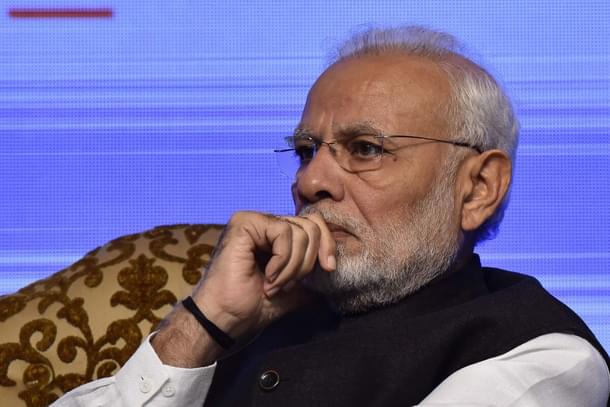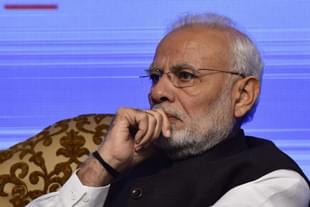News Brief
'I Don’t Make Tough Decisions, I Make The Right Decisions': Key Takeaways From PM Modi's Latest Interview
Kuldeep Negi
Apr 30, 2024, 12:24 PM | Updated 03:34 PM IST
Save & read from anywhere!
Bookmark stories for easy access on any device or the Swarajya app.


Prime Minister Narendra Modi in an interview with News18 Network discussed various aspects of the ongoing election campaign, the achievements of his government, and critiqued the opposition's manifesto proposals.
The interview touched upon key issues surrounding the upcoming elections and the contrasting visions offered by different political parties.
During the interview, PM Modi reflected on the perception that his presence could significantly impact election outcomes, stating that while media often frames elections as referendums on leaders, he views them as celebrations of democracy.
He highlighted his extensive engagements with the public across India, emphasising the importance of connecting with citizens beyond just election periods.
Here are the key takeaways from PM Modi's interview:
Congress' Votebank Politics
Prime Minister Modi delved into the history of votebank politics and reservation policies, particularly focusing on the Congress party's actions.
"You see the history of Congress; this demand (for OBC reservation) has been raised since the 1990s...Before 1990, Congress completely opposed it and suppressed it. Then whatever commissions they formed, whatever committees they formed, their reports also started coming in favour of OBCs. They kept denying, rejecting, and suppressing these views. But after the 90s, due to vote-bank politics, they felt something must be done," he said.
He highlighted instances where Congress had allegedly prioritised political gains over genuine policies, such as attempting to classify Muslims as OBCs for reservation benefits.
"So, what was the first sin they committed? In the 90s, they decided to classify Muslims as OBCs in Karnataka. So they were rejecting and suppressing OBCs earlier, but for political gains, they labelled Muslims as OBCs," PM Modi said.
"Congress was ousted from the Centre. This plan remained stalled till 2004. When Congress came back in 2004, it immediately decided to give OBC quota to Muslims in Andhra Pradesh. The matter got complicated in court. The India Parliament had decided to give 27 per cent reservation to OBCs in line with the basic spirit of the Constitution. Now, they tried to loot this 27 per cent quota," he said.
On former PM Manmohan Singh's 2006 statement that that poor Muslims have the first right on resources, PM Modi said, "In 2006, a meeting of the National Development Council was held where there was a huge uproar over the statement of Singh".
"They remained quiet for two years. In the Ghoshana Patra of 2009, they mentioned it again. In 2011, there is a Cabinet Note on this where they decided to give a share from the OBC quota to Muslims," he said
PM Modi said that Congress tried this in the UP elections too but to no avail.
"In 2012, the Andhra High Court cancelled it. They went to Supreme Court, even there they did not get any relief. The 2014 Manifesto also talked about reservation on the basis of religion," he said.
"When the Constitution of India was made, no RSS or BJP people were present. Babasaheb Ambedkar, Pandit Nehru, Sardar Vallabhbhai Patel and several great men of our country were present, and after long contemplation, they decided that reservation cannot be given on the basis of religion in a country like India," he said.
"See their manifesto for the 2024 elections. It has the imprint of the Muslim League. The way they are flouting the Constitution, the way they are insulting Ambedkar… There is a sword of danger hanging over reservation for SCs and STs. They will make life difficult for OBCs," he added.
Vision for Third Term
PM Modi expressed his vision for making India the third economic superpower globally in his third term.
He emphasised the continuity of efforts from his previous terms and outlined plans for initiatives like PM Surya Ghar Yojana, aiming for zero electricity bills through solar energy, promoting electric vehicles, and reducing dependency on imported petroleum.
"I want to make a start-up hub, manufacturing hub, innovation hub. I want to take the country to a completely new area with a lot of confidence. My vision is clear, I have no doubt," he said.
"After June 4, I am clear what I have to do in the next 100 days as well as by 2047. I am clear of a Viksit Bharat by 2047. That is why I say 24 by 7 for 2047," PM Modi added.
State Dynamics
Criticising the Congress government in Karnataka, PM Modi highlighted issues of governance, law and order, and economic conditions.
He projected a united BJP effort and criticised the Congress for internal leadership struggles.
PM Modi also discussed the political landscape in Maharashtra, highlighting the split within the Shiv Sena and NCP. He emphasised the BJP's focus on the state's welfare and criticised ego-driven decisions within the INDI alliance.
PM Modi predicted a significant victory for BJP in West Bengal, citing public discontent with the current state government, especially regarding law and order issues and corruption allegations.
ED and CBI Misuse Allegations
PM Modi defended the independence of investigative agencies and refuted claims of political vendetta.
"Not one case has been dropped. Whatever the courts decide will happen. They are independent. Second, how many such cases pertain to the political leadership? Only 3 per cent," he said.
"Even big bureaucrats are in jail. After all, why were these agencies formed? If these agencies were formed with a purpose, won’t they fulfil that? Our courts are supreme anyway… The courts must be examining it," he added.
Article 370 and CAA
He challenged the opposition's promises to repeal CAA, highlighting the constitutional implications and benefits of revoking Article 370 in Jammu and Kashmir.
"I challenge the Congress party to hold a press conference and say they will restore 370. They talk big about the Constitution. They talk about Babasaheb Ambedkar. They abuse us so much. But Babasaheb Ambedkar’s Constitution was not applicable for the entire nation. For 70 years, the Indian Constitution was not applicable in Jammu and Kashmir," PM Modi said.
"There, Dalits are getting reservation for the first time [after the Article 370 move]. The Valmiki community is getting reservation for the first time. What are they talking about? Do they have the courage to hold a press conference and say ‘we’ll bring back Article 370’? Can any party dare say that?" he added.
BJP-JDU alliance in Bihar
PM Modi said that there is a huge public support for the BJP-JDU alliance in Bihar.
"First, we fought the assembly elections together. Later, they went somewhere and then came back. So, we are together as per the mandate of the people. As far as public support is concerned, I was in Bihar just recently, and I can see it clearly. Even when there is no tent overhead or anything in this heat, still lakhs of people are connected to us," he said.
He expressed confidence that the NDA will win all Lok Sabha seats in Bihar.
"I can see it clearly. Earlier, we used to lose one-odd seat in Bihar, but this time maybe we will not lose even one," he said.
Divine Purpose
PM Modi attributed his decision-making to a sense of divine purpose, suggesting that his actions are guided by a higher calling.
"I don’t make tough decisions, I make the right decisions. Decisions are not tough, decisions should be right; some find them tough. But, sometimes, I do think about how all of this is possible. Just as you are surprised, I too wonder how Modi does this. Then I think, no, maybe God has sent me for this work," he said.
"Whatever I am doing is inspired by a divine power. This could be God's gift, God wants me to do this work and has sent me with a purpose here. And, that’s why, I remain far from the storm," he added.
Kuldeep is Senior Editor (Newsroom) at Swarajya. He tweets at @kaydnegi.





